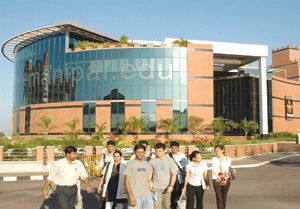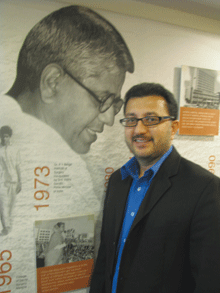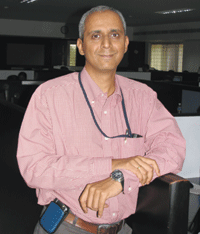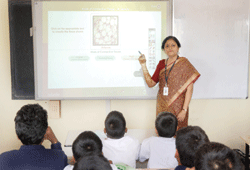The entry of the Manipal Education Group, which over the past half century has focused its energies on higher education, into the primary and secondary schools sector, has created a flutter within the somnolent dovecotes of Indian academia, and generated great expectations within India’s 300 million-strong middle class. Dilip Thakore reports
 The entry announced on December 18 of the Bangalore- based Manipal Education and Medical Group (MEMG) — India’s most respected private provider of professional (medical, engineering, nursing, business management etc) education and perhaps the country’s sole education multinational — into K-12 school education, has caused a flutter within the somnolent dovecotes of Indian academia and excitement within the middle class. With the country’s 1.89 million government (Central, state and municipal) primary and secondary schools written off by the 300 million strong Indian middle class as beyond redemption, the backward integration of the Manipal Group, which over the past half century has focused its energies on higher education, into the private K-12 sector, which is suffering acute capacity shortages, is a historic development. If all goes according to the ambitious nationwide rollout plan of the MEMG top management, the stress and anxiety which middle class households experience at the time of school admissions every year, could be considerably reduced.
The entry announced on December 18 of the Bangalore- based Manipal Education and Medical Group (MEMG) — India’s most respected private provider of professional (medical, engineering, nursing, business management etc) education and perhaps the country’s sole education multinational — into K-12 school education, has caused a flutter within the somnolent dovecotes of Indian academia and excitement within the middle class. With the country’s 1.89 million government (Central, state and municipal) primary and secondary schools written off by the 300 million strong Indian middle class as beyond redemption, the backward integration of the Manipal Group, which over the past half century has focused its energies on higher education, into the private K-12 sector, which is suffering acute capacity shortages, is a historic development. If all goes according to the ambitious nationwide rollout plan of the MEMG top management, the stress and anxiety which middle class households experience at the time of school admissions every year, could be considerably reduced.
Although the Central and state government of Karnataka, which also offer heavily subsidised professional education in government-run medical and engineering colleges, tend to regard the 56-year-old Manipal Group (comprising the 19 institutions of the not-for-profit Manipal University, Sikkim-Manipal University and the commercially-driven MEMG International Pvt. Ltd, which together boast an aggregate enrolment of 167,000 students in India and overseas), with a jaundiced eye, within middle class India, the Manipal Group has built itself an enviable, nationwide reputation. There is widespread awareness within shining India that graduates of Manipal institutions transform into highly successful professionals respected around the world (25 percent of Malaysia’s medical practitioners are Manipal University graduates).
Despite government, the left-dominated intelligentsia, and even the Supreme Court naively disapproving the “commercialisation of education”, of which the Manipal Group is widely regarded as a standard bearer, this education conglomerate has won an excellent public reputation for delivering world class professional education at a fraction of tuition prices abroad, and the actual cost of government subsidised education. Hence great expectations and rising excitement about the Manipal Group’s entry into K-12 education.
 “Although it’s not well known, my grandfather, the late T.M.A. Pai who constructed and promoted our flagship Kasturba Medical College in Manipal in 1953, began his involvement with Indian education by promoting village schools in the Udupi district of Karnataka. Therefore we are no strangers to school education. However even though the focus of the Manipal Group has been on providing higher professional education, of late we have been mulling the idea of re-entering the K-12 schools sector, where there is a severe shortage of institutions delivering good learning outcomes at affordable prices. But since we have a reputation to maintain, we waited for the right moment and right partners rather than venture half-heartedly into this important initiative. The right moment and partners presented themselves about two years ago when we purchased an equity stake in the Bangalore-based company TutorVista Global, a pioneer in the provision of private tuitions worldwide over the internet. Together we have promoted Manipal K-12 Education Pvt. Ltd, which will manage, operate and build high quality schools across the country,” says Dr. Ranjan Pai, managing director and chief executive of MEMG Pvt. Ltd.
“Although it’s not well known, my grandfather, the late T.M.A. Pai who constructed and promoted our flagship Kasturba Medical College in Manipal in 1953, began his involvement with Indian education by promoting village schools in the Udupi district of Karnataka. Therefore we are no strangers to school education. However even though the focus of the Manipal Group has been on providing higher professional education, of late we have been mulling the idea of re-entering the K-12 schools sector, where there is a severe shortage of institutions delivering good learning outcomes at affordable prices. But since we have a reputation to maintain, we waited for the right moment and right partners rather than venture half-heartedly into this important initiative. The right moment and partners presented themselves about two years ago when we purchased an equity stake in the Bangalore-based company TutorVista Global, a pioneer in the provision of private tuitions worldwide over the internet. Together we have promoted Manipal K-12 Education Pvt. Ltd, which will manage, operate and build high quality schools across the country,” says Dr. Ranjan Pai, managing director and chief executive of MEMG Pvt. Ltd.
A graduate of Manipal University and the Children’s Hospital Wisconsin (USA), this grandson of the legendary T.M.A. Pai (1898-1979) and son of Dr. Ramdas Pai, chancellor of Manipal University, proved himself in Malaysia (2000-2005) by bringing the state-of-the-art Melakka-Manipal Medical College which currently has an enrolment of 1,250 students, on stream.
By all indications, Manipal Group’s entry into the school sector has been carefully planned and timed. The first step was taken in 2008, when the Bangalore-based MEMG International Pvt. Ltd acquired “a significant” equity stake in TutorVista Global Pvt. Ltd at a reported price of Rs.12.5 crore. A short while earlier in November 2007, TutorVista, which employs a pool of over 900 Indian teachers to provide online one-on-one private (mainly maths and science) tuition to school students in the US and Europe at a fraction of the hourly price of private tutoring there — a brilliant new technology-driven initiative which received massive media coverage in the US and India in 2007-08 — had bought over the Bangalore-based Edurite Technologies Pvt. Ltd (estb.2000).
Significantly Edurite, like the Delhi-based Educomp Solutions and Chennai-based Everonn Systems, is a pioneer in installing and equipping ICT-driven smart classes in government and private schools in Karnataka and beyond. Currently Edurite (now a wholly-owned subsidiary of TutorVista) is an ICT services provider to over 3,000 primary and secondary schools across the country.
Thus through deft timing and intelligent investment, the MEMG foray into school education has not only got off to a flying start (since Edurite already boasts 3,000 schools across India in its clients base), it has also acquired the expertise and services of a formidable team of proven edupreneurs and education professionals with great track records. Among them: serial entrepre-neur K. Ganesh and his wife Meena, pioneers of the BPO boom of the new millennium, who promoted Customer Asset 24x7 in 2000, which was later acquired by ICICI Bank in 2002 for a reported sum of Rs.105 crore (renamed ICICI One Source).
Subsequently the Ganesh duo promoted TutorVista in 2006 which now also delivers online private tuition to Indian students through Edurite Technologies. And the seriousness of intent of the promoters of Manipal K-12 Education is indicated by the appoint-ment of Meena Ganesh, who after the sale of Customer Asset, had returned to the corporate sector as the chief exec-utive (India) of the British multinational Tesco, for whom she established a back office and IT centre with a headcount of 3,500. Ganesh is chief executive of Manipal K-12 Education.
This augurs well for MEMG’s school education venture because Ganesh, a graduate of Madras University and IIM-Calcutta, brings precious industry and business management experience to Manipal K-12 Education. Her impres-sive curriculum vitae lists senior positions in several blue-chip corporates including NIIT (1985-92), Price Waterhouse (1992-95), Microsoft India (1995-2000), Customer Asset (2000-03) and Tesco (2003-08) before taking charge of Edurite Technologies in September last year.
.gif) “The integration of Edurite which has already built a track record and established business relationships with over 3,000 schools across the country into the Manipal K-12 project, has given us a good start. Even as our Edurite division expands its business of providing ICT services to existing schools, our focus is on promoting new schools under the Manipal School brand name. By the start of the academic year 2010, we intend to have five model Manipal K-12 schools up and running, a number which will rise to 50-100 within the next five years. What will set these schools apart will be their affordable annual tuition fees ranging between Rs.30,000-50,000, excellent technology-enabled teachers trained by us, and best corporate practices. Moreover we intend to enter into partnerships with government schools to sharply improve their learning outcomes through use of enabling new classroom technologies. We have set ourselves the target of setting up one fully digitised smart classroom in 5,000 government schools within the next two years. We believe we have designed a K-12 schools development model which is scalable, affordable and capable of delivering high quality learning outcomes,” says Ganesh.
“The integration of Edurite which has already built a track record and established business relationships with over 3,000 schools across the country into the Manipal K-12 project, has given us a good start. Even as our Edurite division expands its business of providing ICT services to existing schools, our focus is on promoting new schools under the Manipal School brand name. By the start of the academic year 2010, we intend to have five model Manipal K-12 schools up and running, a number which will rise to 50-100 within the next five years. What will set these schools apart will be their affordable annual tuition fees ranging between Rs.30,000-50,000, excellent technology-enabled teachers trained by us, and best corporate practices. Moreover we intend to enter into partnerships with government schools to sharply improve their learning outcomes through use of enabling new classroom technologies. We have set ourselves the target of setting up one fully digitised smart classroom in 5,000 government schools within the next two years. We believe we have designed a K-12 schools development model which is scalable, affordable and capable of delivering high quality learning outcomes,” says Ganesh.
The confidence the top brass of MEMG exudes about the company’s sure success in K-12 school education is based on the sound foundation built for this new enterprise by Edurite Technologies. Although the annual revenue of Edurite (estb. 2000), which is expected to cross the Rs.25 crore mark in fiscal 2008-09, pales in comparison with ICT market leaders such as the Delhi-based Educomp Solutions (Rs.276 crore in 2007-08), and the Chennai-based Everonn Systems (Rs.91.23 crore) — a consequence which Edurite sources attribute to deeper and more thorough content research and development (“rather than content aggregation”) — the new arrangement will give it a massive boost. Currently the company which has 350 employees, delivers ICT-enabled supplementary education services to 2,000 government and 1,000 private schools around the country, says Srikanth B. Iyer, a computer science graduate of Bangalore University with a postgrad degree from Harvard who co-promoted Edurite Technologies Pvt. Ltd in 2000, with the objective of “using technology to enable K-12 education”.
 According to Iyer, following the acquisition of Edurite by TutorVista in November 2007 and injection of new capital into the company, the tempo of research and development has acquired accelerated momentum. In January 2008 Edurite introduced its ICT-driven “open, multimedia database and customisable” services package under the brand name DigitAlly, which offers mapped classroom content of the ICSE, CBSE, IGCSE and IBO examination boards together with its fully-wired i-Classrooms installed in schools under the BOOT (build, own, operate and transfer) model. “Our new i-Classrooms equipped with DigitAlly software have been received with great enthusiasm by more than 100 K-12 school manage-ments across the country. During the past 12 months the revenue from the i-Classrooms division has grown by over 1,700 percent to Rs.17 crore. This augurs well for the future of Manipal K-12 and Indian education,” says Iyer.
According to Iyer, following the acquisition of Edurite by TutorVista in November 2007 and injection of new capital into the company, the tempo of research and development has acquired accelerated momentum. In January 2008 Edurite introduced its ICT-driven “open, multimedia database and customisable” services package under the brand name DigitAlly, which offers mapped classroom content of the ICSE, CBSE, IGCSE and IBO examination boards together with its fully-wired i-Classrooms installed in schools under the BOOT (build, own, operate and transfer) model. “Our new i-Classrooms equipped with DigitAlly software have been received with great enthusiasm by more than 100 K-12 school manage-ments across the country. During the past 12 months the revenue from the i-Classrooms division has grown by over 1,700 percent to Rs.17 crore. This augurs well for the future of Manipal K-12 and Indian education,” says Iyer.
Built on sound foundations, such optimism about the future of the Manipal K-12 initiative seems justified. Following MEMG’s strategic purchase of an equity stake in TutorVista just after the latter company had subsumed Edurite Technologies, the new company is endowed with the experience and domain knowledge of all three entities now agglomerated under the Manipal K-12 umbrella. Moreover the outcome of this series of mergers and acquisitions, and intelligent financial engineering is that Manipal K-12 Education Pvt. Ltd is now a multi-divisional corporate with five high-potential businesses, viz, i-Classroom, school management services, digital software provision, Edurite tutorials (tech-enabled tuition centres promoted countrywide to prepare students for class X, XII and public entrance exams), and retail (marketing over 150 products and consumables required by individual learners).
However much of the confidence of the bullish top management of Manipal K-12 Education flows from a huge investment that the MEMG-TutorVista partnership has made in the company’s backroom research and development operation, the traditional blindspot of Indian industry and academia.
 “During the past decade the R&D division of Edurite Technologies has painstakingly developed formidable technology and content development capability. The USP of our supplementary multimedia content is that it is balanced and does not impose what’s known as ‘cognitive overload’ on teachers or students. Moreover our curriculum mapped content is thoroughly indigenous and designed for Indian classrooms within local contexts. Right from identifying pain or difficult learning areas, creating story-boards, designing graphics and animation to voice-overs, recording, video-shoots and teacher training, we have developed impressive in-house capability. Now the absorption of this capability into the new company — Manipal K-12 Education — will enable us to apply our curriculum enrichment expertise countrywide as Manipal K-12 expands its operations,” says G. Ramamoorthy a graduate of the College of Engineering, Trivandrum with 17 years of experience in the IT industry in the US, UK and Switzerland, working with US Technology, Deutsche Software, IMR Global and Accenture prior to signing up with Edurite in 2007.
“During the past decade the R&D division of Edurite Technologies has painstakingly developed formidable technology and content development capability. The USP of our supplementary multimedia content is that it is balanced and does not impose what’s known as ‘cognitive overload’ on teachers or students. Moreover our curriculum mapped content is thoroughly indigenous and designed for Indian classrooms within local contexts. Right from identifying pain or difficult learning areas, creating story-boards, designing graphics and animation to voice-overs, recording, video-shoots and teacher training, we have developed impressive in-house capability. Now the absorption of this capability into the new company — Manipal K-12 Education — will enable us to apply our curriculum enrichment expertise countrywide as Manipal K-12 expands its operations,” says G. Ramamoorthy a graduate of the College of Engineering, Trivandrum with 17 years of experience in the IT industry in the US, UK and Switzerland, working with US Technology, Deutsche Software, IMR Global and Accenture prior to signing up with Edurite in 2007.
News of the absorption of Edurite Technologies into the new company, Manipal K-12 Education, has winged its way across the country arousing high expectations within Edurite’s 3,000-strong customer base. “Although we have installed our own hardware in our classrooms, we have been using the textbook mapped software of Edurite Technolgies in our ICSE schools for the past two years with a fair degree of satisfaction. Now with the takeover of Edurite by Manipal K-12 we expect the speed of customisation of mapped curriculums which has been slow, to improve in the near future,” says Moideen Kutty, the chairman-promoter of the MES Group (estb.1970) of institutions in Tirur, Kerala which runs 28 schools and 20 colleges with an aggregate enrolment of 37,000 students in India’s most literate state.
 Likewise Anand Chawla, the head of technology at Mumbai’s well-reputed Poddar International School (estb. 2005), which has 10,000 class I-XII students taught in two shifts on its muster rolls, is optimistic that the Manipal K-12 initiative will enhance the good experience the school has had with the curriculum mapping services and DigitAlly supplem-entary software hitherto provided by Edurite. “Our experience with the ICSE curriculum mapping software and DigitAlly teacher supplem-entary package of Edurite has been very good. Now with greater resources being invested in the new company’s R&D, things can only get better,” says Chawla.
Likewise Anand Chawla, the head of technology at Mumbai’s well-reputed Poddar International School (estb. 2005), which has 10,000 class I-XII students taught in two shifts on its muster rolls, is optimistic that the Manipal K-12 initiative will enhance the good experience the school has had with the curriculum mapping services and DigitAlly supplem-entary software hitherto provided by Edurite. “Our experience with the ICSE curriculum mapping software and DigitAlly teacher supplem-entary package of Edurite has been very good. Now with greater resources being invested in the new company’s R&D, things can only get better,” says Chawla.
Against this backdrop of flashing green lights for the mint-fresh Manipal K-12 Education, it’s hardly surprising that Umashankar Vishvanath, the cheerful president of the company who intends to focus his attention on the continuous development of all schools under the Manipal K-12 umbrella, is confident about the success of this carefully strategised and engineered company in the booming primary-secondary education marketplace. An economics alum of Madras University with an MBA from Delhi University’s highly reputed Faculty of Management Studies, Vishvanath who signed up with Manipal K-12 last July (2008), brings a wealth of education experience to his critical new assignment having served with several blue-chip IT companies including Wipro, Tata Unisys, Motorola, and a long stint (2000-06) with ILFS-ETS, a pioneer in popularising new technology-enabled education in India.
 “The Manipal K-12 initiative is India’s most carefully conceptualised and completely developed programme in school education distinguished by detailed engineering,” says Vishvanath. “It offers Edurite’s well-developed ICT services to all schools; a globally unique three-year in-service training programme for school teachers certified by Manipal University; a school quality manage-ment system which standardises curriculum input, quality of delivery, and testing and assessment systems; guaranteed high quality learning outcomes; and a schools ERP (enterprise resource planning) including teacher evaluation system. Moreover all Manipal K-12 managed and/or owned schools will have a global awareness programme built into the curriculum, and will offer a Children’s Wellness Programme designed by the Manipal medical group. Manipal K-12 will offer children robust, well-rounded primary and secondary education from well-trained teachers, using new technologies to deliver predictable learning outcomes at affordable cost,” promises Vishvanath.
“The Manipal K-12 initiative is India’s most carefully conceptualised and completely developed programme in school education distinguished by detailed engineering,” says Vishvanath. “It offers Edurite’s well-developed ICT services to all schools; a globally unique three-year in-service training programme for school teachers certified by Manipal University; a school quality manage-ment system which standardises curriculum input, quality of delivery, and testing and assessment systems; guaranteed high quality learning outcomes; and a schools ERP (enterprise resource planning) including teacher evaluation system. Moreover all Manipal K-12 managed and/or owned schools will have a global awareness programme built into the curriculum, and will offer a Children’s Wellness Programme designed by the Manipal medical group. Manipal K-12 will offer children robust, well-rounded primary and secondary education from well-trained teachers, using new technologies to deliver predictable learning outcomes at affordable cost,” promises Vishvanath.
Quite obviously the carefully planned, and purposeful entry of the highly reputed Manipal Group into school education isn’t good news for market leaders Everonn, Educomp, NIIT and ILFS-ETS. Yet it’s pertinent to bear in mind that between them they have reached hardly 1 percent of India’s 1.24 million primary and secondary schools countrywide, and at best a mere 4 percent of the country’s 75,000 private schools.
Therefore there is room enough for all of them in the country’s grossly under-served school education market. Moreover intensifying competition in the K-12 education services is certain to spur the research and development efforts of the country’s leading ICT-driven companies, which cannot but do India’s obsolescent school education sector a whole lot of good.
It’s also important to note that the market development efforts of India’s rapidly multiplying ICT-driven education services companies are not restricted to private schools. Acknowledging the sheer number of government — Central, state and municipal — schools (1.89 million) leading corporates in ICT-driven school services have wired up government schools as well.
Thus Educomp has planted its corporate flag in 7,300 government schools, Everonn Systems in 4,442 K-12 government schools and Manipal K-12 (through Edurite) in over 2,000. For the lay public, the greatest benefit of the Manipal K-12 initiative will be reduction of the stress and strain that millions of middle class households are subject to at the start of each academic year, when there is an annual stampede for admission forms of the much-too-few schools offering acceptable quality education at affordable prices.
In a season of all-pervasive gloom following the global economic meltdown, that’s a welcome silver lining .
To view Major Institutions of Manipal Group click: userfiles/file/Major%20institutions%20of%20Manipal%20Group.pdf